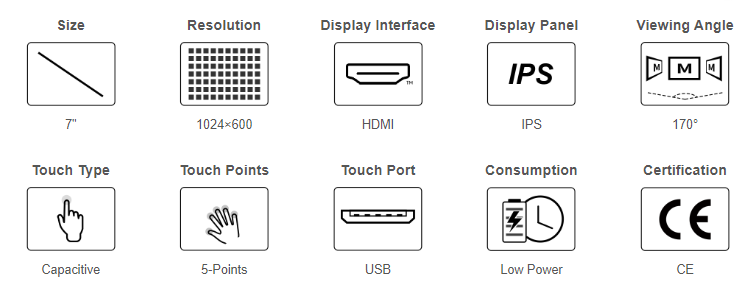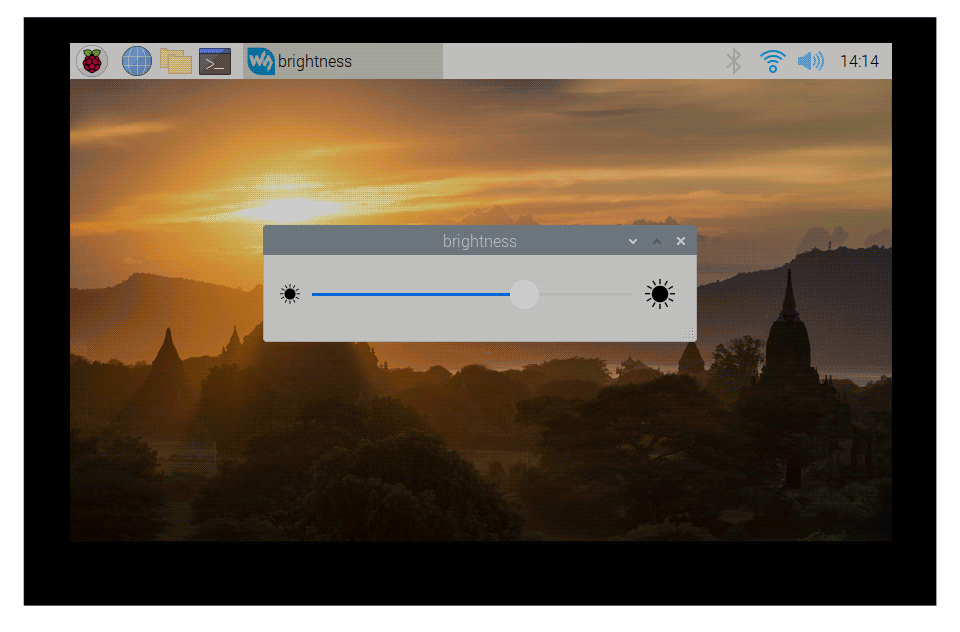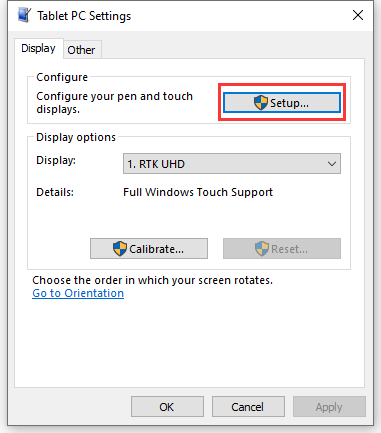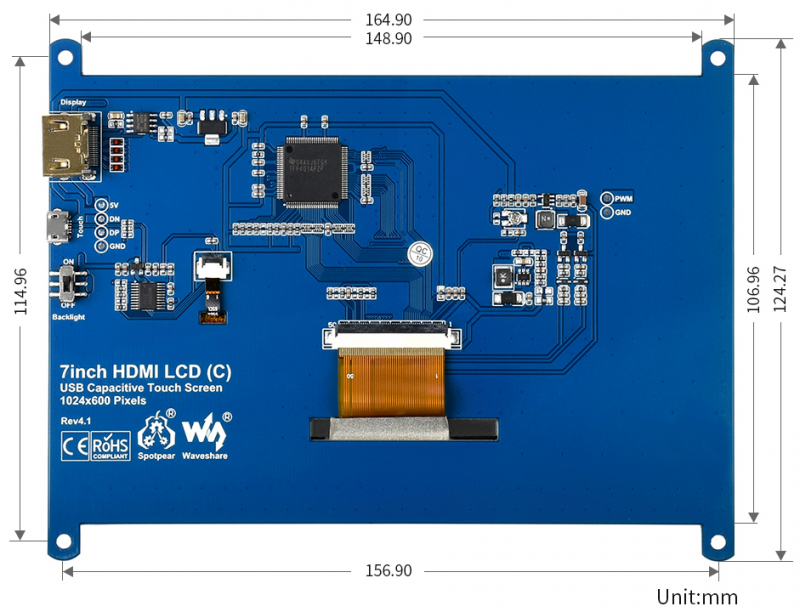7inch HDMI LCD (C)
| ||
Overview
7-inch HDMI display, with a resolution of 1024 × 600 and a capacitive touch panel, which supports Raspberry Pi and can also be used as a computer monitor.
| More |
Features
- 7-inch IPS screen with a hardware resolution of 1024 × 600.
- 5-point capacitive touch control.
- When used with Raspberry Pi, supports Raspberry Pi OS/Ubuntu/Kali and Retropie
- Use as a computer monitor, it supports Windows 11/10/8.1/8/7, five-point touch, no need to install any drivers.
- Support Ubuntu when working with Jetson Nano.
- Support backlight control, more power saving.
Specification
| Item | Description | Unit |
|---|---|---|
| Model | 7inch HDMI LCD (C) | / |
| Size | 7.0 | Inch |
| Viewing Angle | 170 | Deg |
| Resolution | 1024×600 | Pixels |
| Dimension | 164.90(H)×106.96(V)×8(D) | mm |
| Display Area | 154.21(H)×85.92(V) | mm |
| Pixel Pitch | 0.1506(H)×0.1432(V) | mm |
| Color Gamut | 45% | NTSC |
| Max Brightness | 300 | cd/m² |
| Contrast | 800:1 | / |
| Backlight Adjustment | PWM Software Adjustment | / |
| Refresh Rate | 60 | Hz |
| Display Interface | Standard HDMI interface | / |
| Power Port | 5V | / |
| Power Consumption | 2.5 | Watt |
Electrical Parameters
| Parameter | Min. Value | Standard Value | Max. Value | Unit | Note |
|---|---|---|---|---|---|
| Input Voltage | 4.75 | 5.00 | 5.25 | V | Note 1 |
| Input Current | 500 | 500 | TBD | mA | Note 2 |
| Operating Temperature | 0 | 25 | 60 | ℃ | Note 3 |
| Storage Temperature | -10 | 25 | 70 | ℃ | Note 3 |
•Note 1: Input voltage exceeding the maximum value or improper operation may cause permanent damage to the device.
•Note 2: The input current should be ≥500mA, otherwise it will lead to start-up failure or abnormal display, and a long time in an abnormal state may cause permanent damage to the device.
•Note 3: Please do not put the display in a high temperature and high humidity storage environment for a long time, the display needs to work within the limit value, otherwise it will be possible to damage the display.
EDID Sequence Parameters
If the system of the main control board can automatically identify the EDID for display, there is no need to set the relevant timing parameters additionally.
Otherwise, you can refer to the following EDID settings:
| Pixel Clock | H Addressable | H Blanking | V Addressable | V Blanking | H Front Porch | H Sync Width | V Front Porch | V Sync Width | H Image Size | V Image Size | H Border | V Border |
|---|---|---|---|---|---|---|---|---|---|---|---|---|
| 49.00 | 1024 | 288 | 600 | 24 | 48 | 96 | 3 | 10 | 154 | 86 | 0 | 0 |
Interface Introduction
- ① Standard HDMI interface: control the display.
- ② micro USB interface: for power supply and touch.
- ③ Backlight On/Off: for backlight control.
About the version
Rev4.1 version
- Update the USB touch protocol to improve compatibility.
- Brightness is adjustable by the USB interface.
- Modify the drive circuit to enhance the anti-interference ability.
- Change the touch panel color to black.
Rev3.1 version
- The Rev3.1 version mainly changes the touch chip of the Rev2.2 version from GT811 to GT911. The touch effect is better, and the anti-interference ability is enhanced at the same time.
- This version is fully compatible with Rev2.1 and Rev2.2, and users can replace it with confidence.
Rev2.2 version
- Rev2.2 version mainly adds a VCOM adjustable potentiometer and related circuits of electromagnetic compatibility based on Rev2.1.
- This version is fully compatible with the Rev2.1 version, and users can replace it with confidence.
Rev2.1 version:
- Upgrade to IPS screen, with a larger viewing angle and a clearer display effect, I believe you will like it.
- Use standard HID protocol, you can transplant your own system conveniently.
- Using with Raspberry Pi, it supports Raspbian/Ubuntu/Kali/Retropie and WIN10 IoT, single touch, no need to install any drivers.
- Using as a computer monitor, it supports Windows 10/8.1/8/7, five-point touch, no need to install any drivers.
Rev1.1 version:
- Using private HID protocol, it is difficult to transplant to your own system.
- Using Raspberry Pi, you need to install a driver when the display connects to Raspbian or Ubuntu systems. and it doesn't support Kali, Retropie, and Windows 10 IoT.
Anti-Piracy
Since the first-generation Raspberry Pi released, Waveshare has been working on designing, developing, and producing various fantastic touch LCDs for the Pi. Unfortunately, there are quite a few pirated/knock-off products in the market. They're usually some poor copies of our early hardware revisions, and comes with none support service.
To avoid becoming a victim of pirated products, please pay attention to the following features when purchasing:
Beware of knock-offs
Please note that we've found some poor copies of this item in the market. They are usually made of inferior materials and shipped without any testing.
You might be wondering if the one you're watching or you've purchased in other non-official stores is original, feel free to contact us.
How to use
Working with Raspberry Pi
Hardware Connection
- 1. Connect the Touch interface to the USB interface of the Raspberry Pi.
- 2. Connect the HDMI interface to the HDMI interface of the Raspberry Pi.

Software Setting
This LCD can support Raspberry Pi OS/Ubuntu/Kali/Retropie systems. When the LCD works on systems such as Raspberry Pi OS, the resolution must be set manually, otherwise, it will cause an abnormal display.
Please download the latest version of the image on the Raspberry Pi official website.
1) Download the compressed file to the PC, and unzip it to get the .img file.
2) Connect the TF card to the PC, and use SDFormatter software to format the TF card.
3) Open the Win32DiskImager software, select the system image downloaded in step 1, and click 'Write' to write the system image.
4) After the image has finished writing, open the config.txt file in the root directory of the TF card, add the following code at the end of config.txt, then save and quit the TF card safely.
hdmi_group=2 hdmi_mode=87 hdmi_cvt 1024 600 60 6 0 0 0 hdmi_drive=1
5) Insert the TF card into the Raspberry Pi, power on it, and wait a few seconds for a normal display.
Backlight Adjustment
wget https://files.waveshare.com/upload/0/01/Brightness-HDMI.zip unzip Brightness-HDMI.zip cd Brightness-HDMI sudo chmod +x install.sh ./install.sh
Working with PC
Support Windows 11 / 10 / 8.1 / 8 / 7
1) Connect the Touch interface of the LCD to the USB interface of the PC. Wait for a while, the windows will automatically recognize the touch function.
2) Connect the HDMI interface of the LCD to the HDMI interface of the PC. Wait for a while, the windows will automatically recognize the display function.
Note:
1) When the computer is connected to multiple monitors at the same time, the touch effect of the 7-inch LCD will be applied to the main screen by default. If you need to specify the touch to the secondary screen, see #Calibration touch on Win 10 PC
2) Some of PC cannot support the HDMI screen Hot Plug. In this case, restarting the PC can solve.
3) Sometimes LCD will flicker because of undersupplying from the USB cable of the PC. You need to connect an external power supply (5V/2A) to the DC port.
Brightness Adjustment on Windows via Software
- 1. Download and unzip USB Brightness Adjustment Demo.
- 2. Enter "WS_USB_Brightness_Win.exe", and then Windows can recognize it normally and prompt "the device is connected". You can drag the slider to adjust the backlight.
Calibration Touch on Win 10 PC
Take the windows10 system as an example:
- 1. Enter the Windows settings of the system, type in the search bar, and click "Calibrate the screen for pen or touch input" (as shown in the picture below):
- 2. Click "Setup" in the pop-up "Tablet PC Settings" interface:
- 3. The following text prompt will appear on the screen. Please tap the touch screen with your finger, and the computer will recognize it as a touch screen.
【Note】If the touch screen is blank, press the "Enter" key, and the text prompt will switch to the touch screen. (The screen which displays the text prompt will be used as a touch screen!)
Dimensions
Resource
Documents
- 7inch HDMI LCD (C) User Manual
- 7inch HDMI LCD (C) panel dimension
- Assembly tutorial with 7inch HDMI LCD (C) (with bicolor case)
- Working with Volumio
- CE RoHS
Software
3D Drawings
FAQ
Add the following command to /boot/config.txt:
disable_splash=1
{{{5}}}
Replace the custom image with the image in this directory /usr/share/plymouth/themes/pix/splash.png.
{{{5}}}
Test environment: 2022-04-04-raspios-bullseye-armhf 32-bit system
Supported models: Support Waveshare DSI LCD, DPI LCD, and HDMI LCD capacitive touch screen series.64bit system does not support by default
Software Installation
wget https://files.waveshare.com/upload/1/18/Evdev-right-click-emulation.zip unzip Evdev-right-click-emulation.zip cd evdev-right-click-emulation sudo apt install build-essential libevdev2 libevdev-dev cd 'evdev-right-click-emulation' sudo cp 'out/evdev-rce' '/usr/local/bin/' sudo chmod +x '/usr/local/bin/evdev-rce'
Enter the command:
sudo evdev-rce
After running, you can touch and long press to realize the right-click function.
Set IP
sudo usermod -G 'input' -a pi echo 'uinput' | sudo tee -a /etc/modules sudo nano /etc/udev/rules.d/99-uinput.rules
Add in 99-uinput.rules file.
KERNEL=="uinput", MODE="0660", GROUP="input"
save it and run it in the terminal.
sudo udevadm control --reload-rules sudo udevadm trigger
Then reboot:
sudo reboot
Run after reboot (no sudo needed at this point).
evdev-rce
After running, you can touch and long press to realize the right-click function.
Set Startup
Enter the terminal:
sudo mkdir ~/.config/autostart sudo nano ~/.config/autostart/right_click.desktop
Add the following in right_click.desktop.
[Desktop Entry] Version=1.0 Type=Application Name=evdev-rce GenericName=Enable long-press-to-right-click gesture Exec=env LONG_CLICK_INTERVAL=1000 LONG_CLICK_FUZZ=200 /usr/local/bin/evdev-rce Terminal=true StartupNotify=false #If you want to modify the sensitivity, you can modify the size of the two parameters, LONG_CLICK_INTERVAL=1000 LONG_CLICK_FUZZ=200.
{{{5}}}
- Edit the config.txt and add this line at the end of the config.txt file:
hdmi_drive=1
{{{5}}}
{{{5}}}
{{{5}}}
Support
Technical Support
If you need technical support or have any feedback/review, please click the Submit Now button to submit a ticket, Our support team will check and reply to you within 1 to 2 working days. Please be patient as we make every effort to help you to resolve the issue.
Working Time: 9 AM - 6 PM GMT+8 (Monday to Friday)
















